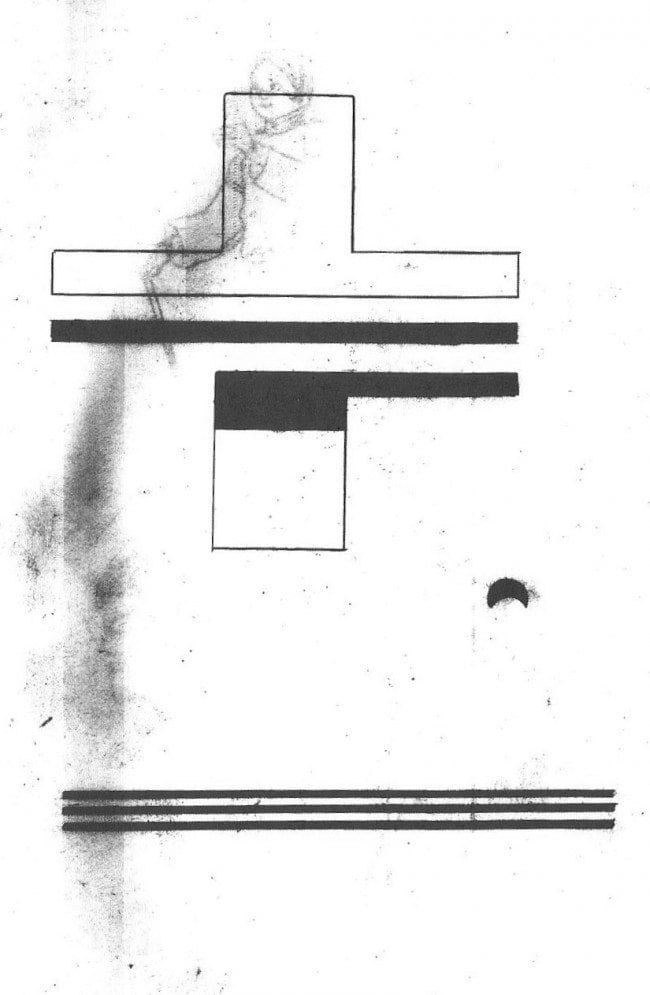The latest release from Providence-based noise cartoonist Christopher “CF” Forgues is something of a departure from his previous output, but it’s one that makes sense. Over the past decade or so, CF has gone from a marginal figure in the culty art-comix circle to perhaps the most influential cartoonist making noncommercial work on a regular basis. Though his stories in Powr Mastrs, Kramers Ergot, and The Ganzfeld (among numerous others) ring with conceptual focus and clarity of execution, the biggest reason for Forgues’s catapult to the top of the other comics heap is his often imitated but never equaled drawing style, which fuses childlike simplicity to virtuosic nuance beneath a pencil line that crackles with a raw energy wholly its artist’s own. The more work he puts out, the more CF emerges as that rarest of creatures: a true visionary who has chosen to devote himself to making comics.
It's appropriate, then, that Sediment showcases the pure form of CF’s vision, set free from narrative content. A multi-media compilation of work done for gallery exhibitions, commercial illustrations, sketchbook pages, and miscellany, it manages to give an impressively well-rounded overview of the various facets of its artist’s creativity, the things that make CF both unique and valuable. This isn’t a comic as such -- except for the reprint of a short Bookforum strip that closes things out, the imagery collected here is not sequential -- but it also can’t quite be called an art book, given its pocket size and total lack of explanatory text. The most accurate description for it is simply “a book,” one consisting entirely of pictures. A space that belongs entirely to the images, free of even character and plot's distractions, where the audience can come to see just how much CF's hands are able to do to their eyes.

Loosely organized into sections, the book has the feel of a deftly sequenced music album; shifting from penciled tableaux into vividly painted portraits and back before giving way to sketches and more abstract paintings, its scope feels both vast and tightly narrowed. Each individual image is a look into something notably distinct from both the next and the last, but shapes and colors and compositional methods reprise themselves again and again, pulling a far-flung catalog of pictures produced at different times for different purposes together into a seamlessly unified body of work. The book’s publication design, executed by the artist himself, is perfectly of a piece with its content, both sparse and decadent. Intricate networks of simple, bold shapes edge the French-folded pages, the paper stock switches from matte for single-tone drawings to glossy for the color paintings, and psychedelic endpapers herald the reader's entry into a different world. Sediment’s small size, perhaps the most immediate thing about it, foregrounds the physical aspect of CF’s imagery, forcing readers into and intimate engagement with it. There's no way to read but to come in close and consider the graphite dust and paint crust that the pictures are made of, the wrinkled paper they’re set down on, rather than stepping back and taking every component in at once.
These are drawings to be lived with, to spend time engaged in. The paintings showcase far-flung ideas about fashion and culture, alternating between simple pinup style shots and more topical scenes featuring what look like alternate-world versions of art galleries and sporting events, while the black-and-white illustrations give views into places both crowded and quiet, where unfathomable machines and futuristic architectural creations find a place in expanses of empty space or nature. CF addresses where he’s coming from at a few points -- most notably in the short strip that closes the book by questioning the utilitarian importance of comics, but also in sketchbook drawings that appear to be copied from the sublimely bizarre erotic comics of Frank Thorne and portraits that lead right back to the alien ideas about costuming introduced by Steve Ditko. And for those who’ve been waiting breathlessly to see CF’s take on '80s action cartoonist Matt Wagner’s shadowy avenger Grendel, well, he’s in here too. There's no need for words to create a context here if one's attuned to the right signifiers.

But mostly, the book chases down things as yet unseen with an unescapable intensity. Not one of the characters or landscapes put on display here feels anything less than fully formed, drawn with the same high focus it's been glimpsed at. The hallmark image of the book is one of its simplest, a painting of a puce-faced man in a tight, hooded black outfit staring at a formless blob of pink paint on a pedestal, immersed in contemplation. What looks like a futuristic piece of sculpture is no more -- no less -- than a smear of pure medium on paper. Sediment puts us in the place of the painting’s strange-looking subject, both marveling at and actively thinking about the power of the pure substances that make up the pictures we look into. The book’s conceptual glue may be CF’s wonderful drawing style, but its real asset is the way it enables us to get past that dazzling surface and into conversation with the crude materials underlying it. Sometimes a title says it all.







